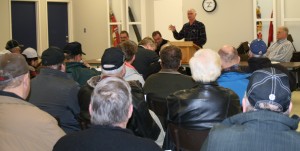(Swan River, Manitoba, February 12, 2016) More than 50 farmers from the Swan River and Pelly areas of Manitoba and Saskatchewan met February 10th and unanimously passed a resolution calling for “the re-establishment of the Canadian Wheat Board (CWB), and single-desk selling of grain in western Canada.”
Kyle Korneychuk, spokesperson for the Canadian Wheat Board Alliance, an independent and non-partisan prairie-wide farm group noted: “The fact a farm meeting of this size could unanimously pass this resolution is a strong indication to Ottawa that farmers are now feeling the loss of the CWB in their pocketbooks.”
Korneychuk thanked the Manitoba Minister of Agriculture Ron Kostyshyn and elected Rural Municipal (RM) Councillors from both provinces for their support at the meeting. “Farmers respect those who consistently support them as this Minister has demonstrated.”
Responding to a study by Dr. Richard Gray of the University of Saskatchewan showing farmers lost about 6.5 billion dollars in the past two years; Agriculture Minister Kostyshyn said he is “very concerned about the financial situation of farmers since the loss of the CWB.” The Minister also expressed concern about the future of the rail line to the Swan River valley as well as the rail line to Churchill. RM councillors expressed concerns about the recent closures of elevators and the long-term implications for the rail line.
The meeting, chaired by Minitonas, Mb. farmer Walter Kolisnyk, heard presentations from the Hon. Ron Kostyshyn, Wheat Board Alliance organizer and Swan River grain farmer Ken Sigurdson , and Kyle Korneychuk a farmer-elected Director of the Canadian Wheat Board who was dismissed, along with his colleagues, when former Agriculture Minister Ritz passed legislation ending the Canadian Wheat Board. Last year the Harper government transferred the remaining assets of the Wheat Board to a company jointly owned by the Government of Saudi Arabia and Bunge, one of the world’s largest private grain traders.
Sigurdson pointed out Professor Gray’s study when compared with the single-desk CWB’s annual audited statements shows that with the single-desk system prairie farmers received over 90% of the port price and now without the single-desk farmers are only receiving between 40-60% of the port price for their wheat.
Using Manitoba Crop Insurance data, Sigurdson calculated the loss to the Swan River Valley to be more than 70 million dollars over the last 2 years. “This money is lost to farmers and the community and transferred directly to grain handling companies and railways,” he said.
Kyle Korneychuk explained the CWB coordinated logistics to move grain from the farm gate via rail to port then usually arranged ocean freight direct to end-use customers. He noted “this integrated single-desk system allowed us to provide a high quality branded product into the world market. It allowed us to return almost the full value of the world price to farmers. Farmers only paid for the CWB’s operating expenses but now they pay for the private trade’s operating expenses and the profits to foreign shareholders and grain company owners.”
Korneychuk went on to observe that under the system controlled by grain companies fusarium and other blending programs are no longer being provided and protein premiums are now small and infrequent.
Ken Sigurdson predicted that when short term Federal subsidies to the port of Churchill end next year, it will be the next casualty caused by the end of the single-desk CWB. He noted that although the port remains a strategically valuable national resource, it is at risk of losing its economic reason for existence: grain movement.
Sigurdson observed the single-desk CWB was the economic lynch pin which made prairie grain production viable by ensuring the efficient movement and reliable delivery of high quality-assured grain to customers and guaranteeing that farmers received the premiums customers paid. “To get the advantages of the CWB there is no other solution than to reinstate the CWB single-desk selling system” he concluded.
The meeting concluded by unanimously passing the following resolution:
WHEREAS, The loss of the farmer elected, single-desk Canadian Wheat Board has resulted in an increasingly dysfunctional rail system, no grain logistics oversight, a loss of transport efficiency on rail and at sea, reduced grain quality guarantees to other nations, and an overall loss of 6.5 billion dollars in income to farmers over the last two years, which has been devastating to the economy of Western Canada; and
WHEREAS, The ending of the CWB marketing system has resulted in the loss of thousands of jobs across Canada including 460 direct good quality jobs in the heart of Winnipeg and a further 1,834 full-time equivalent jobs that were sustained by the CWB’s administrative expenditures;
THEREFORE BE IT RESOLVED, That this meeting supports the farmers of Western Canada by calling for the re-establishment of the Canadian Wheat Board (CWB), and single-desk selling of grain in western Canada.




Could people go to jail over this? It [taking the CWB] does seem like a theft over a certain threshold incident that would dictate that type of a penalty in a society with a decent justice system. I would be a bit nervous attempting a similar caper I know that. It is definitely not a petty crime.
The elevator companies that farmers deliver grain to own the grain and resell that grain in many cases to themselves in an other country. Farmers now understand the scale of the mess that Harper and Ritz created by destruction of our CWB.
Farmers and the Government do need to rebuild our CWB. The CWB existed for the Farmers not for the elevators. The CWB was able to put the elevators on a fixed income thus saving and Earning our Canadian farmers a lot of revenue. We see the vast costs that farmers now pay to elevators as a big loss of farm income.
It does not matter what you might have thought about the CWB before, it is clear now that without the CWB farmer income is easily taken by grain traders.
A Public Audit of the CWB destruction by Harper and Ritz is needed.
What percentage of farmers do we need to get this done Personally I know this is worth doing
Since it was taken away without a vote and the assets taken without compensation, I would say natural justice demands that it be returned immediately.
Thanks for standing up for farmers with a clear evidence based resolution. All farmers need to take the time to understand why that motion is essential to our economic future.